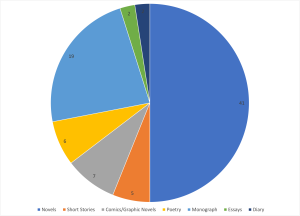Alright. So, I missed a week, and it’s a relatively short list this week. It’s the end of the semester. I’m lucky to be awake.
Video: Wildfire (SBTRKT cover) by Jeni
I am a sucker for anybody using a loop pedal (or computer equivalent). Watching somebody build a song up, live, out of a few simple elements, playing along with themselves; so very cool. This girl does a really good version of this SBTRKT song, and I would enjoy listening to that in any case, but the looping is what sold me on the video.
Article: I’m still here: Back Online after a Year Without the Internet by Paul Miller
I have posted a couple of Paul Miller’s dispatches from offline over the last year, but had noticed lately that, first, they were getting few and far between, and second, that when they did appear they seemed pretty gloomy. Turns out there was a reason for that. Miller discovers something that, in retrospect, should have been obvious: the internet is not the problem— you are. He hoped that disconnecting would make him more productive, less distracted and more able to focus, more creative, etc. And, to some extent, it did, for a little while. But before long he found new distractions, and new ways to waste time without technology. We blame the internet for a lot these days, but nobody’s forcing you to keep updating your Twitter feed. So, on one level, this is just a reminder that we have some agency in all this. But it also makes a good case for the internet as a means of making and maintaining connections. By going offline, Miller didn’t just miss out on cat videos and Geroge Takei’s Facebook posts; he didn’t get to Skype with distant relatives, or chat with friends, or just keep up with the lives of people whom he cares about. The internet is a tool, and like any tool it can be used well or badly; not using it at all is throwing the good out with the bad.
Video: A Boy and His Atom: The World’s Smallest Movie by IBM
The latest installment from We Live in the Future: IBM made a stop-motion animated film by manipulating individual atoms. Those little balls are atoms. If that doesn’t kind of blow your mind, then I don’t know what to do for you.
Article: The Mind of a Con Man by Yudhijit Battacharjee
Diederik Stapel was a prominent researcher in social psychology, with many significant publications to his credit. Turns out, though, that he made a lot of his experimental data up— not lied about the results, but just didn’t do the experiments at all. Typed a bunch of numbers into a spreadsheet, played with them until he got the results he wanted and they looked plausible, wrote them up and sent them off. He got away with it for years, until finally somebody asked to see data that he should have had, but didn’t. Now his career is more or less over, as University officials and journal editors try to figure out just how much of what he published was fiction. That’s a fairly remarkable story in itself, but what really stood out about this for me was how little attempt Stapel makes to excuse himself. Usually when there is some kind of high-profile scandal of this nature— James Frey’s fake memoir, say, or Jonah Lehrer’s plagiarism— the guilty party makes some kind of effort to make excuses, to say, in effect, that anyone in their place might have done what they did. Stapel doesn’t do that; he just acknowledges that he did something pretty crappy. On one level, that is refreshing, but on another it’s kind of disturbing— the excuses give us some insight into the ways in which people can talk themselves into thinking something like this is okay, but here that’s missing. Why did he do it? He wanted to be a successful researcher, and so he published the results that would get him there. End of story. Not crazy, not delusional, bot even lazy, really— just unwilling to deal with experiments that wouldn’t come out the way he wanted.


